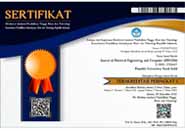SISTEM PENDUKUNG KEPUTUSAN REKOMENDASI TOPIK JUDUL SKRIPSI MENGGUNAKAN METODE NAIVE BAYES CLASSIFIER
(1) * Andi Wijaya
 (Universitas Nurul Jadid)
(Universitas Nurul Jadid) Indonesia
(*) Corresponding Author
AbstractDecision Support System (DSS) is a computer-based interactive application that combines data and mathematical models to assist the decision-making process in dealing with a problem.[1] At the Faculty of Engineering, Informatics Study Program, Nurul Jadid University, there are several stages in the process of preparing a thesis that students need to do, namely submission of thesis titles, submission of thesis proposals, proposal seminars, research and thesis guidance. After writing is considered ready and finished, students present the results of their thesis at the lecturer examines the thesis exam, but students whose thesis exam results pass with revisions, carry out the revision process in accordance with the examiner's input. The problem that is often experienced by students at the Faculty of Engineering Informatics Study Program is the process of submitting thesis titles, where students have difficulty determining the topic of thesis title. Then a Decision Support System for Thesis Title Topic Recommendations was created using the Naive Bayes Classifier Method at the Faculty of Engineering, Informatics Study Program, Nurul Jadid University, which aims to help facilitate lecturers and students in the management process of determining the recommendation criteria for thesis title topics, the process of managing thesis title recommendations and thesis title submissions, the method used is prototyping with the PHP programming language, MySQL database and the Naive Bayes Classifier method, for system design using Flowcharts, DFD, and ERD. Based on the results of the Naive Bayes Classifier method, it produces test results with very good Likert scale calculations with a high accuracy value of 96.6%. |
Keywords
Full Text: PDF
Refbacks
- There are currently no refbacks.
Copyright (c) 2023 Andi Wijaya









